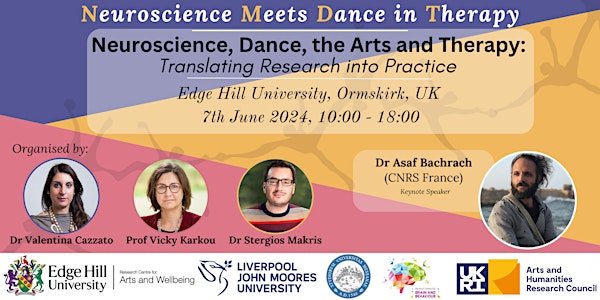
Neuroscience, Dance, the Arts and Therapy
The conference will draw together the NMDT network's previous workshops and will initiate discussions for future avenues of research.
Date and time
Location
Edge Hill University
Saint Helens Road Ormskirk L39 4QP United KingdomAbout this event
- 8 hours
The conference will draw together our previous three workshops and will initiate discussions for future avenues of research. It is intended as a forum for scholars in the field of neuroscience, dance and therapy to present their work and develop interdisciplinary ideas. It will explore concepts such as embodiment, relationality, movement metaphor and narrative, advancing the practice of dance and dance movement psychotherapy in enabling wellbeing and supporting mental health. It will also expand our knowledge on applications of neuroscientific research in the arts and arts therapies more generally.
Conference Programme:
9:30 - 10:00: Registration
10:00 - 10:30: Welcome by Dr Valentina Cazzato and Prof Vicky Karkou
10:30 - 11:30: Keynote Talk by Dr Asaf Bachrach (CNRS France):
Improvising Science
The title of my talk is ambiguous: is it about the scientific study of improvisation or an (improvised) approach to doing science? I would like to answer yes to both, and in fact, I have come to believe that the two are complementary and co-dependent. In this talk, I will share with you some of our experiences in scientifically studying dance improvisation, or more accurately, making use of dance improvisation as a tool to ask questions about cognition, both individual and social. I will present some results of studies with adults and children with specific brain characteristics. For example, the effect of improvised dance training on the social and temporal abilities of children with unusual cerebellum features, and the interplay of agency and creativity during dance improvisation in Virtual Reality. However, my main focus will be on the how, on the process of a transdisciplinary collective inquiry, where improvisation plays a role in the elaboration of the scientific questions as well as in the approach to addressing them. I will revisit the notion of ‘community of practices’, where actors from different fields, with different agendas and motivations, come together to study. Working as a community of practices is particularly important in projects that connect scientists, artists, therapists, caregivers, and patients. I will propose that collective improvisation is the appropriate ethical and epistemological framework within which communities of practices or contact zones can emerge.
11:30 - 12:00: Coffee break
12:00 - 12:15: Short Experiential workshop
12:15 - 13:00: Panel 1: Observing Dance
13:00 - 14:00: Lunch
14:00 - 14:15: Short Experiential workshop
14:15 - 15:00: Panel 2: Dancing with Another
15:00 - 15:30: Break
15:30 - 15:45: Short Experiential workshop
15:45 - 16:30: Panel 3: Inner dancing
16:30 - 17:00: Break
17:00 - 17:30: Performance
17:30 - 18:00: Plenary
We are accepting posters from early career researchers to showcase at the conference. Please send a title and abstract to R.J.Clark@ljmu.ac.uk by the 30th April.